How to remove old hidden device drivers from Windows 11
Windows stores all the device drivers you have used on your machine. Often, these old and outdated device drivers do take up storage space and may conflict with existing new drivers. It is completely safe to remove these old hidden drivers and you can do it easily. In this article, we will demonstrate how to safely remove all old, incompatible device drivers from your system.
How to Safely Remove Old Hidden Device Drivers
It is very easy to remove all outdated device drivers from your system.
Step 1 View all devices
You can view all devices with a simple adjustment in system properties.
1. To open File Explorer, you must press ⊞ Win key R.
2. Then, write this " sysdm.cpl " and press Enter key.
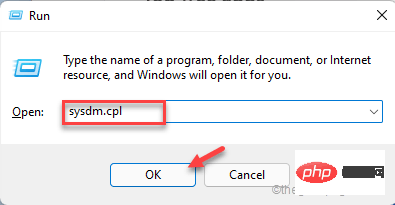
This will open the System Properties window.
3. When the System Properties panel opens, go to the "Advanced" section.
4. Here, click "Environment Variables...".
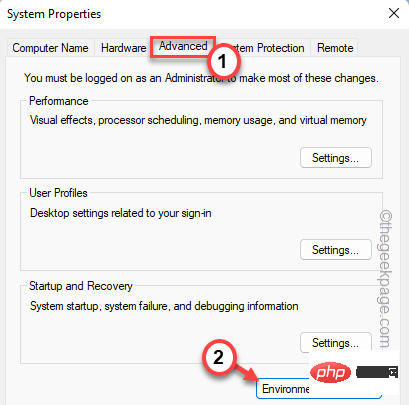
5. Now, in the User Variables section, click on "New...".
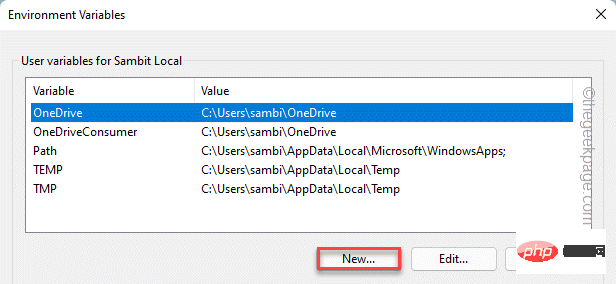
6. After that, copy-paste it into the "Variable Name:" box -
devmgr_show_nonpresent_devices
7. Then, Set "Variable Value:" to "1" and click "OK".

8. After that, click "OK" to save these changes.
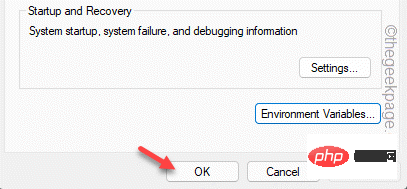
This way you can view all unused devices.
Step 2 Uninstall the device driver
1. You must open the Device Manager. To do this, press the ⊞Win R key combination.
2. Then, enter “ devmgmt.msc ” and click “ OK ” to open the device manager.
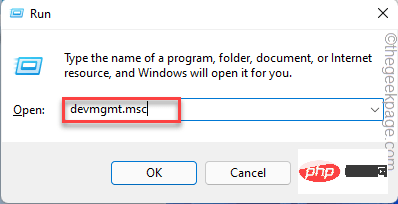
#3. Device Manager lists all device drivers on the system. However, usually, it hides any device drivers that you are not using or removes the device from the system.
4. So, click on "View" and then click on "Show Hidden Devices" to view all hidden device drivers.
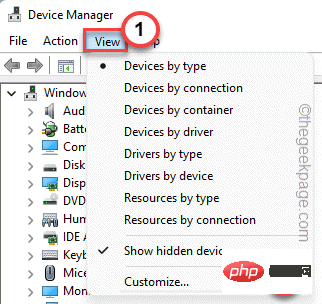
5. Now, expand the different sections. Then, look carefully for old or drivers you don't need. These drivers will be grayed out.
[If you see any old audio or video drivers, follow the next method to uninstall the display driver from your system. ]
6. Except for the graphics card and audio driver, right-click the gray driver and click "Uninstall Device".
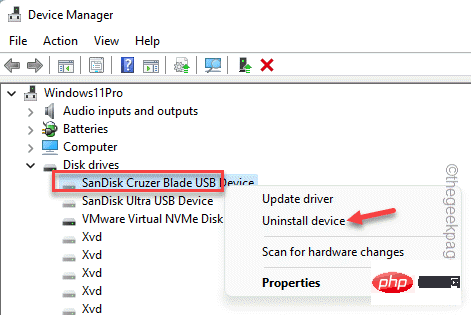
7. Then, click "Uninstall" to confirm the process.
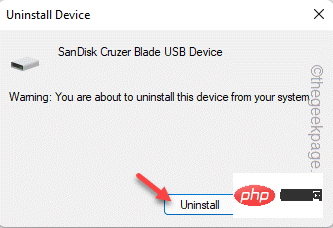
#8. Repeat the same steps to uninstall all device drivers from the system.
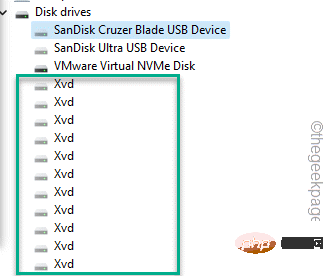
#After you are sure that all old device drivers have been removed, close Device Manager.
How to safely remove graphics and audio device drivers
If you want to remove graphics and audio device drivers, you must use the Display Driver Uninstaller tool. However, there are a few steps you need to follow.
Step 1
You must download the Display Driver Uninstaller (DDU).
1. First, you have to access the display driver uninstaller.
This will automatically download a zip file on your system.
2. Go to the location where you downloaded the DDU zip file.
3. Now, just unzip the DDU zip file. Remember where you want to extract the files.
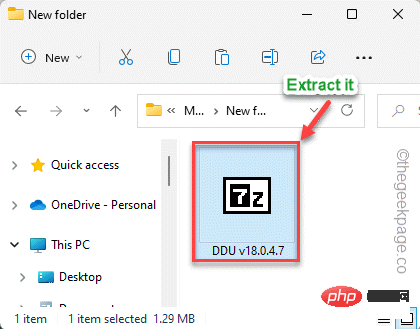
Close File Explorer when finished.
第 2 步 – 在安全模式下启动
现在,您可以启动进入安全模式并从那里使用 DDU。
1. 打开设置。
2. 在设置窗口中,进入“系统”设置。
3. 如果您向下滚动右侧窗格,您将找到“恢复”选项。只是,点击它。
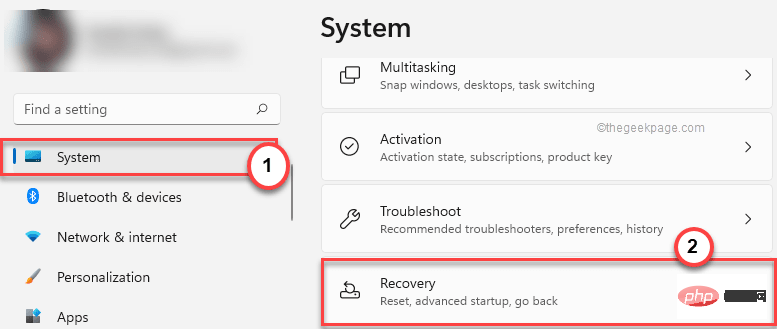
4. 现在,要启动恢复过程,请点击“立即重新启动”。
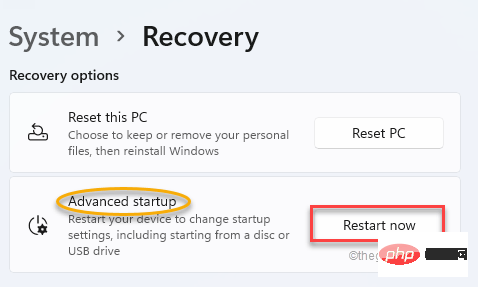
您的系统将重新启动进入 Windows 恢复模式。
5.到达那里后,单击“疑难解答”以解决此问题。
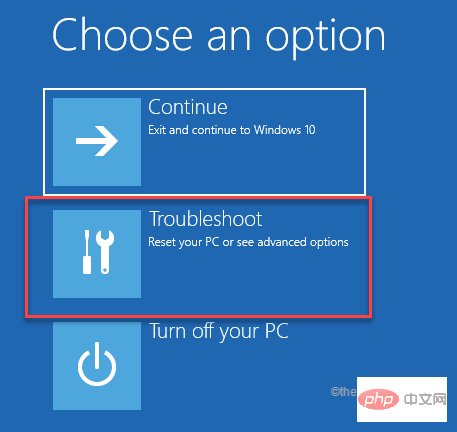
6. 在下一页上,找到并点击“高级选项”菜单。
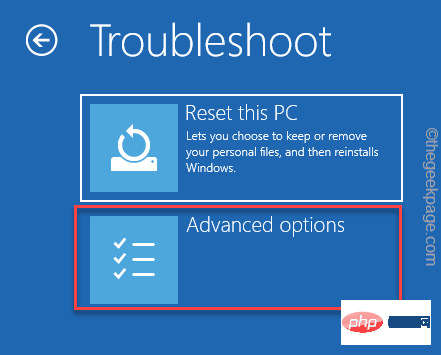
7. 这里会有多种选择。您必须单击“启动设置”才能访问它。
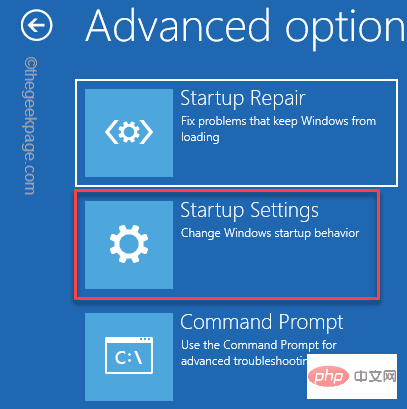
8. 只需点击一次“重新启动”选项。
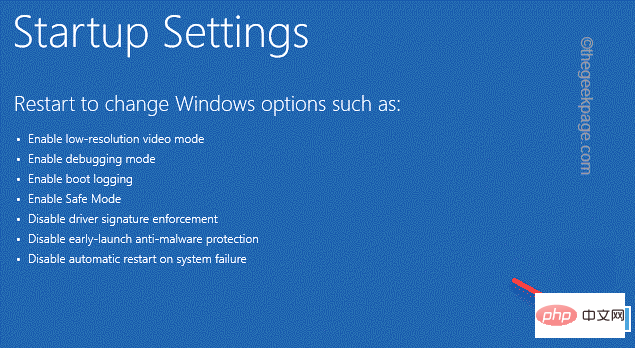
这将重新启动您的系统并显示
9. 您只需按键盘上的F4即可选择“启用安全模式”选项。
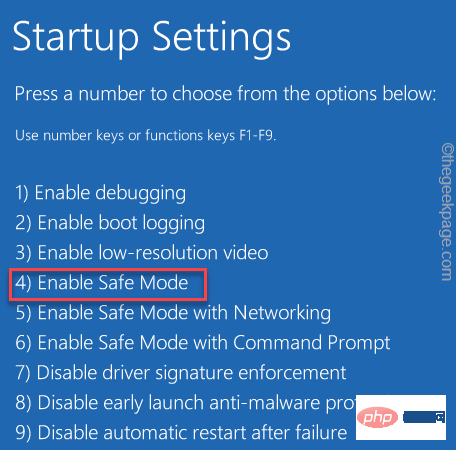
只需等待您的系统启动进入安全模式即可。
STEP 3 使用 DDU
现在,当您启动到安全模式时,您可以使用 DDU 工具。
1. 在安全模式下,打开文件资源管理器并转到您提取 zip 文件的文件夹。
2. 然后,双击DDU 文件夹进行访问。
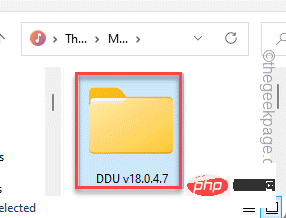
3.然后,点击“ Display Driver Uninstaller ”访问它。
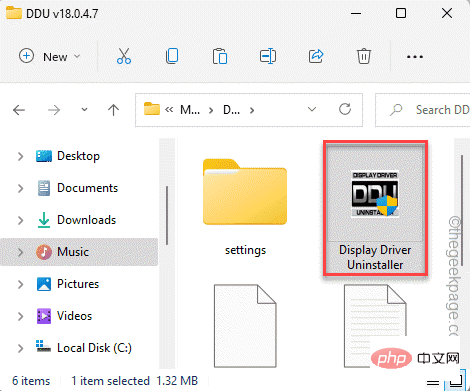
4. DDU 打开后,点击“确定”。
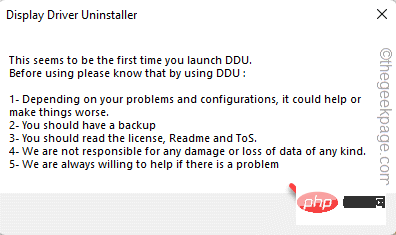
5. 这将自动打开选项页面。现在,确保选中“当“Windows”搜索设备驱动程序时阻止从“Windows 更新”下载驱动程序” 。
6. 现在,根据显卡 (AMD/NVIDIA),转到相应的部分。您必须选择删除 GPU/音频驱动程序的所有痕迹。因此,请选中所有框。
完成后,关闭页面。
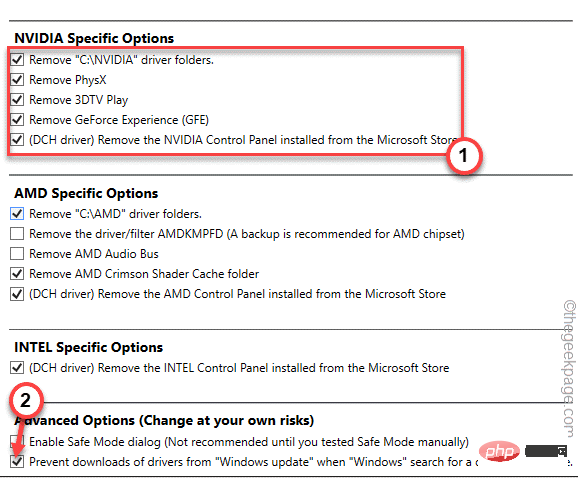
7. 在 DDU 页面上,点击“选择设备类型”并选择音频或 GPU,您要删除的内容。
8. 然后,点击“选择设备”并选择制造商。
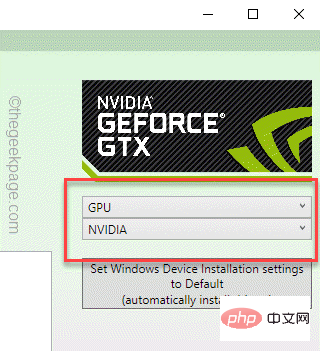
9、然后,点击“清理并重启”,删除旧显卡/声卡驱动,重启系统。
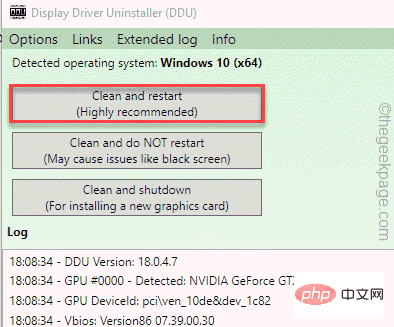
现在,您无需执行任何操作。DDU 将卸载驱动程序并可能会重新启动机器几次。
这样,您可以从系统中移除旧的显卡/音频设备。
可选步骤
此外,您可以使用磁盘清理从系统中清除所有旧设备和驱动程序。
1.您必须打开磁盘清理。因此,按Win 键 + R。
2. 然后,输入这一行并按Enter。
清洁工
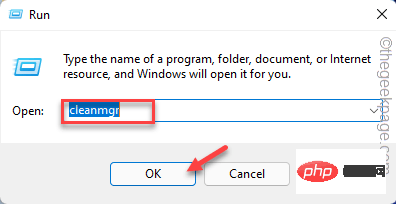
3. 出现磁盘清理时,选择“ C: ”驱动器并点击“确定”。
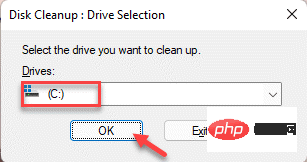
4. After that, click "Clean System Files".
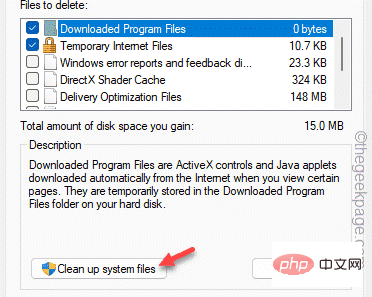
5. Again, you must select the C: drive.
6. After that, check "Device Driver Package" and click "OK".
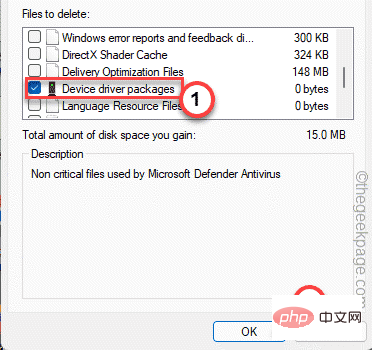
This will remove the device driver package from your system.
The above is the detailed content of How to remove old hidden device drivers from Windows 11. For more information, please follow other related articles on the PHP Chinese website!

Hot AI Tools

Undresser.AI Undress
AI-powered app for creating realistic nude photos

AI Clothes Remover
Online AI tool for removing clothes from photos.

Undress AI Tool
Undress images for free

Clothoff.io
AI clothes remover

Video Face Swap
Swap faces in any video effortlessly with our completely free AI face swap tool!

Hot Article

Hot Tools

Notepad++7.3.1
Easy-to-use and free code editor

SublimeText3 Chinese version
Chinese version, very easy to use

Zend Studio 13.0.1
Powerful PHP integrated development environment

Dreamweaver CS6
Visual web development tools

SublimeText3 Mac version
God-level code editing software (SublimeText3)

Hot Topics
 1659
1659
 14
14
 1416
1416
 52
52
 1310
1310
 25
25
 1258
1258
 29
29
 1233
1233
 24
24
 Can I install mysql on Windows 7
Apr 08, 2025 pm 03:21 PM
Can I install mysql on Windows 7
Apr 08, 2025 pm 03:21 PM
Yes, MySQL can be installed on Windows 7, and although Microsoft has stopped supporting Windows 7, MySQL is still compatible with it. However, the following points should be noted during the installation process: Download the MySQL installer for Windows. Select the appropriate version of MySQL (community or enterprise). Select the appropriate installation directory and character set during the installation process. Set the root user password and keep it properly. Connect to the database for testing. Note the compatibility and security issues on Windows 7, and it is recommended to upgrade to a supported operating system.
 How to solve mysql cannot connect to local host
Apr 08, 2025 pm 02:24 PM
How to solve mysql cannot connect to local host
Apr 08, 2025 pm 02:24 PM
The MySQL connection may be due to the following reasons: MySQL service is not started, the firewall intercepts the connection, the port number is incorrect, the user name or password is incorrect, the listening address in my.cnf is improperly configured, etc. The troubleshooting steps include: 1. Check whether the MySQL service is running; 2. Adjust the firewall settings to allow MySQL to listen to port 3306; 3. Confirm that the port number is consistent with the actual port number; 4. Check whether the user name and password are correct; 5. Make sure the bind-address settings in my.cnf are correct.
 MySQL can't be installed after downloading
Apr 08, 2025 am 11:24 AM
MySQL can't be installed after downloading
Apr 08, 2025 am 11:24 AM
The main reasons for MySQL installation failure are: 1. Permission issues, you need to run as an administrator or use the sudo command; 2. Dependencies are missing, and you need to install relevant development packages; 3. Port conflicts, you need to close the program that occupies port 3306 or modify the configuration file; 4. The installation package is corrupt, you need to download and verify the integrity; 5. The environment variable is incorrectly configured, and the environment variables must be correctly configured according to the operating system. Solve these problems and carefully check each step to successfully install MySQL.
 Unable to access mysql from terminal
Apr 08, 2025 pm 04:57 PM
Unable to access mysql from terminal
Apr 08, 2025 pm 04:57 PM
Unable to access MySQL from the terminal may be due to: MySQL service not running; connection command error; insufficient permissions; firewall blocks connection; MySQL configuration file error.
 How to copy and paste mysql
Apr 08, 2025 pm 07:18 PM
How to copy and paste mysql
Apr 08, 2025 pm 07:18 PM
Copy and paste in MySQL includes the following steps: select the data, copy with Ctrl C (Windows) or Cmd C (Mac); right-click at the target location, select Paste or use Ctrl V (Windows) or Cmd V (Mac); the copied data is inserted into the target location, or replace existing data (depending on whether the data already exists at the target location).
 Solutions to the errors reported by MySQL on a specific system version
Apr 08, 2025 am 11:54 AM
Solutions to the errors reported by MySQL on a specific system version
Apr 08, 2025 am 11:54 AM
The solution to MySQL installation error is: 1. Carefully check the system environment to ensure that the MySQL dependency library requirements are met. Different operating systems and version requirements are different; 2. Carefully read the error message and take corresponding measures according to prompts (such as missing library files or insufficient permissions), such as installing dependencies or using sudo commands; 3. If necessary, try to install the source code and carefully check the compilation log, but this requires a certain amount of Linux knowledge and experience. The key to ultimately solving the problem is to carefully check the system environment and error information, and refer to the official documents.
 Can mysql run on Windows
Apr 08, 2025 pm 01:54 PM
Can mysql run on Windows
Apr 08, 2025 pm 01:54 PM
Running MySQL on Windows is feasible, but challenges such as port conflicts, permission issues, and environment variable settings need to be considered. Installation issues can be solved by customizing configuration files, adjusting user permissions, and setting environment variables correctly. Additionally, the appropriate storage engine should be selected, tweaked configuration files, and SSDs should be used to optimize performance.
 Can vs code run in Windows 8
Apr 15, 2025 pm 07:24 PM
Can vs code run in Windows 8
Apr 15, 2025 pm 07:24 PM
VS Code can run on Windows 8, but the experience may not be great. First make sure the system has been updated to the latest patch, then download the VS Code installation package that matches the system architecture and install it as prompted. After installation, be aware that some extensions may be incompatible with Windows 8 and need to look for alternative extensions or use newer Windows systems in a virtual machine. Install the necessary extensions to check whether they work properly. Although VS Code is feasible on Windows 8, it is recommended to upgrade to a newer Windows system for a better development experience and security.



